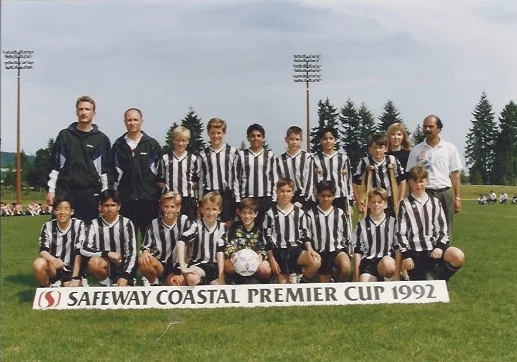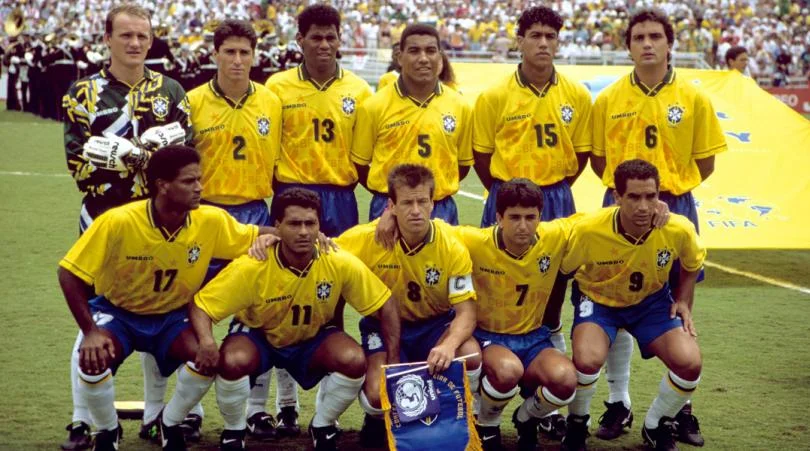King Eric: Master and Madman
“If ever there was one player, anywhere in the world, that was made for Manchester United, it was Cantona. He swaggered in, stuck his chest out, raised his head and surveyed everything as though he were asking: ‘I’m Cantona. How big are you? Are you big enough for me?”
“Fuck off Cantona, say Fuck off Cantona” rang out from the terraces of the Holte End at Villa Park. The chorus seemed to reverberate from each side of the concrete stadium walls and fixate upon the number 7 dressed in all white. You could be forgiven if you thought you were watching Real Madrid had your eye been only cast upon the magnificent, statuesque player however, it was actually Aston Villa versus Leeds United playing in the inaugural Premier League season – the year 1992 in Birmingham, United Kingdom.
My Dad had decided that, at the raw age of 12, I was ready for my first experience of English football's terrace culture. As our family was based out of Birmingham, there was no better match for inauguration than Villa vs. Leeds and more specifically, the opportunity to catch a glimpse of the sublime Frenchman that was Eric Cantona. We were accompanied by my Uncle, an ardent Leeds United supporter and my Cousin, a Birmingham-based Liverpool fan. As per tradition, we went to one of a plethora of boozers prior to the match where working class men were sinking pints like Mr. Freezes on a sunny day and the youngsters were indulging in lemon-limes and packs of hula-hoops.
As the anticipation continued to heighten, we decided to make our way to the stadium accompanied by masses of the claret and blue supporters, the Villains. The energy was electric as it was only the second game of the season and both teams had high expectations for the campaign. Leeds, the defending Champions, were composed of a hard-nosed spine including Gary Mcallister and David Batty complimented by the mercurial talent of Cantona and a deadly poacher in Lee Chapman. Villa had speed to burn on the flank with Tony Daley including a slick finisher of their own in Dalian Atkinson.
I could feel the intensity of the support as soon as I saw green grass within the confines of Villa Park. We were situated at the top of the Holte End where it was standing room only, the preferred method of seating for hardened football supporters. I was pretty small statured so my view was red Levi labels on the rear-ends of beer-fuelled mad-men until my Dad propped me up on the concrete beam to our right. My perspective had gone from worst to first and I became engrossed - not in the match but in the man. Cantona was still a relatively new name in English football but his elegance and class stood out beyond any other participant on the pitch. His movement was flawless as he galloped around the pitch like Secretariat at the Kentucky Derby. His technique was so graceful and he caressed the ball with such panache. The respect for the man was so great that the home support had created songs in an attempt to gain ingress to his head hoping to mitigate his influence on the game. My focus was so intensely fixated that I lost consciousness of anything other than Cantona.
One thing that stood out to me was his temperament. Each time Cantona was fouled he was disgusted, and looked towards the culprit condescendingly with such confident egotism that it could empower those associated with him while destroying the opposition. However, what was clearly evident was the short fuse which accompanied such dazzling talent - and more specifically, how simple it was to rile his inner devil and initiate him into a spiral of self-detriment.
It is often considered that the greatest players in the world have a self-inflicting soul which consistently hinders their progression into the upper-echelons of the football world. However, in contrast it is also agreed that without that specific, potentially destructive, characteristic which drives their influence they would not be so explicitly brilliant. Cantona fit the above to aplomb exemplified by his Jekyll and Hyde persona which saw him kung-fu kick a fan and get banned from football for 8 months. His inner Jekyll reappeared when he made his comeback in arguably the biggest derby match in the world when United faced Liverpool at Old Trafford. He set-up a goal and basically won a penalty with a sublime pass. The confidence he had was epitomized when he stepped up and banged in the penalty right down the middle of the goal.
“My best moment? I have had a lot of good moments but the one I prefer is when I kicked the hooligan”
The same year I had the pleasure of watching Cantona live in the flesh, he was duly sold to Manchester United for a paltry £1 million – a steal for Sir Alex Ferguson and the instigator to the downfall of Leeds United made by Howard Wilkinson – all because Wilkinson became fed up with Cantona’s temperament. Regardless, my fascination with Cantona continued and I always had an eye on his career, ensuring I watched him at every possible moment as it would have been a sin to avoid such unique excellency.
“Eric Cantona (also) brought an extra dimension (to Manchester United). Plenty of things he tried didn’t come off, but you remember the ones that did — the flicks, the outrageous lobs. He made things look easy that weren’t easy at all. Before him, we struggled to score as a team, but as soon as he arrived the goals flowed.”
Manchester United adopted Cantona with open arms and immediately coined him the King - King Eric. The arrogance to flip his collar up and puff out his chest became a trademark. All the while, the young talent permeating through the youth ranks at United into the first team were enamoured with him and determined to win the auditions to be part of Cantona’s supporting cast in ‘United’s emergence.’ Supporters of the club may look back upon their recent period of glorious triumph and credit the famous class of 1992 as the group which gave the club the impetus to succeed. While Paul Scholes, Nicky Butt, David Beckham, Ryan Giggs and the Neville brothers, Gary and Phil will go into the history books as the Group which created sustainable prosperity for the Red Devils, it was Cantona who gave them that ‘je ne sais quoi’ which no other club in the land had. All of the top clubs had great players but United had King Eric - the greatest of his time. Before he signed, United hadn’t won the top prize in English football since the 1966-67 season yet the five years which Cantona spent at the club garnered 4 League Championships and 2 League and Cup doubles – a turnaround which really did "knock Liverpool right off their fucking perch" – and yes, I did print it.
A magician who gave me the 'joie de vivre' for the beautiful game at such a young age. An egotist with the talent to back it up. A temperamental soul who brought the best of Hollywood to Manchester and across the island of Great Britain. King Eric will be remembered as the fabulous Frenchman who held flair and feistiness in equal accord and exuberated fantasy football at it’s finest.
That summer evening in 1992 was my football turning point. It transformed my love for the beautiful game into a passion due to the fact that King Eric intensified sport such that it became drama. Following him through the 81 minutes which he was on the pitch for was the best piece of improvisation I have ever witnessed in-between the white lines. He brought out an affection in me that I had never felt for football - defined by raw emotion and unwavering obsession. I’ve been blessed to witness Messi score four at the Nou Camp, Ronaldo be bowed upon at the Bernabeu and Bayern run riot at the Allianz however, watching King Eric Cantona at Villa Park was the equivalent of watching Marlon Brando in the Godfather – it was for me like viewing the greatest of the greats and the image is imprinted upon my mind, never to be erased.
“I try to find different ways of expressing myself. Without that I will die”


















